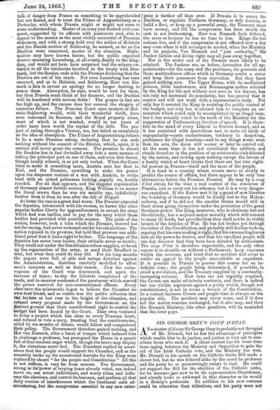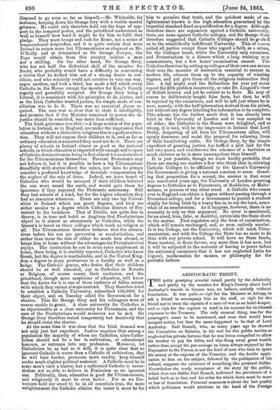SIR GEORGE GREY'S COUP D'ETAT.
AS a master of Sir George Grey is probably not the equal Of Mr. Disraeli, but he has the advantage of principles which enable him to do justice, and justice is very apt to con- ciliate those who seek it. A silent contest has for some time been raging between the Ministry and Opposition to gain the aid of the Irish Catholic vote, and the Ministry has won. Mr. Disraeli in his speech on the Catholic Oaths Bill made a clever bid, but he was fettered alike by the creed he professes and the party he so perseveringly essays to lead. He could not support the Bill for the abolition of the Catholic oaths, for he assumes just now to be the representative Churchman, and already looks as awkward in that character as he would in a Bishop's petticoats. No addition to his new costume could be otherwise than ,ridiculous, and his party were net disposed to go even so far as himself,—Mr. Whiteside, for instance, keeping down his Orange fury with a visible mental grimace. He could only therefore hold out the hope of sup- port to the temporal power, and the priesthood understand as well as himself how hard it might be for him to fulfil that pledge. They want troops and cash for Rome, not a series of transcendental despatches, and it is quite certain that were Ireland to return none but Ultramontanes as eloquent as Mr. O'Reilly and as determined as Sir George Bowyer, the Pope would obtain from this country neither a man nor a shilling. On the other hand, Sir George Grey, who has not half the dialectical skill of the member for Bucks, who probably would have a difficulty in convincing a victim that he kicked him out of a strong desire to con- ciliate, and who certainly could not contrive to vote one way, argue another, and look a third, has made a bid which every Catholic in the House except the member for King's County eagerly and gratefully accepted. Sir George Grey being a Liberal, it is consistent with his principles to do justice, and as the Irish Catholics wanted justice, his simple mode of con- ciliation was to do it. There was no oratorical finesse re- quired. The case was so clear that to state it intelligibly, and promise that if the Ministry remained in power the in- justice should be remedied, was more than sufficient.
The Irish grievance was this : —A. large section of the popu- lation in Ireland, as in England, are under the impression that education without a distinctive religious bias is a godless educa- tion. They will not expose their children to it, and as far as ordinary education is concerned they need not do it. There are plenty of schools in Ireland almost as good as the national schools, in which education is imparted with enough and to spare of Catholic distinctiveness, being in fact almost too ecclesiastical for the Ultramontanes themselves. Fervent Protestants may not believe it, but it is possible to bore a lay Ultramontane dreadfully with stories about the saints, nor does he always consider a profound knowledge of decretals compensation for the neglect of the rule of three. Indeed, we have heard of Catholics who would be annoyed if their children believed the sun went round the earth, and would quiz them for ignorance if they repeated the Ptolemaic astronomy. Still they had schools of a kind, but for the higher education they had no resources whatever. There are only two lay ITniver- aities in Ireland which can grant degrees, and they are ,either secular to a degree which Catholics distrust or Pro- testant to the backbone. That of Dublin, not quite free in theory, is in tone and habit so Anglican that Presbyterians 'object to it almost as strenuously as Catholics, while the Queen's is based on three colleges which teach no religion at all. ' The Ultramontane therefore believes that the alterna- tives before his son are perversion or secularization, and rather than incur the risk of either he sends him abroad, or keeps him at home without the advantages his Protestant rival enjoys. The instruction he can in some cases supplement at home, there being, it is credibly reported, Catholics who know Greek, but the degree is unattainable, and in the United King- dom a degree in many professions is a faculty as well as a badge. The Catholic gentry, who desire that their children should be as well educated, say as Catholics in Bavaria or Belgium, of course resent their exclusion, and the priesthood, though more suspicious of education, still know that the desire for it is one of those instincts of fallen nature with which they cannot always contend. They therefore tried to establish a Catholic University, subscribed 130,000/. for their object, and on Tuesday asked the Government for a charter. This Sir George Grey and his colleagues were of course unable to grant. A close university for Catholics is as objectionable as a close university for Protestants, and the case of the Presbyterians would moreover not be met. Sir George Grey therefore stated temperately but decisively that he should resist the charter.
At the same time it was clear that the Irish demand was not only just but expedient. Justice requires that among a population the majority of whom are Catholics, ultra-Catho- licism should not be a bar to cultivation, or educational honours, or entrance into any profession. Moreover, let Catholicism be as bad as it will, it is quite clear that an ignorant Catholic is worse than a Catholic of cultivation, that he will hate harder, persecute more readily, keep himself under much slighter political restraint. A Catholic must be in men's en's view a traitor, but a cultivated Catholic is never-
theless not as able to believe in Fenianism as an ignorant one. Politically, then, education is good for Ultramontafies, and religiously it must. be even better. For as we Pro- testants hold our creed to be in all essentials true, the more enlightenment the Catholic obtains the easier it must be for him to perceive that truth, and the quickest mode of en- lightenment known is the high education guaranteed by the impartial standard fixed as qualification for a degree. Although therefore there are arguments against a Catholic university, there are none against Catholic colleges, and Sir George Grey therefore suggested that Catholic Colleges should be grafted on to the scientifically indifferent University. This of course suited all parties except those who regard a faith as a crime, for the Colleges teach, while the University only examines, and Protestantism is a disease which a long training raly communicate, but a few hours' examination cannot. The Catholics therefore by setting up colleges of their own can secure their sons the measure of instruction essential to success in modern life, educate them up to the capacity of winning degrees, and yet give them all the religious instruction they like. A lad might read the Bollandists for ever yet never repeat the fifth problem incorrectly, or take Dr. Liugard's view of British history and yet be correct as to facts. He may of course be deliberately taught false facts, but then he will be rejected by the examiners, and will be left just-where ho is now, namely, with the half information derived from his priest, but without any degree labelling his information to be complete. This scheme has the further merit that it has already been tried in the University of London and it was accepted on all sides ; the Catholics in the House were delighted, and so strong, it is said, will be the impression in Ireland that Lord Derby, despairing of aid from his Ultramontane allies, will openly denounce and resist the proposal for relieving them of their humiliating oaths. Sir George Grey, by the simple expedient of granting justice, has baffled a plot laid for the last two years, and overthrown the schemes of a tactician as much cleverer as he is more unscrupulous than himself.
It is just possible, though we trust hardly probable, that there are among our readers a few who think that in allowing Catholic Colleges to be affiliated to the Queen's University the Government is giving a national sanction to error. Grant- ing that proposition for a second, the answer is that error was sanctioned years ago, the University of London granting degrees to Catholics as to Protestants, or Buddhists, or Mahe- metans, or persons of any other creed. A Catholic who comes over to England can obtain a degree without passing through a Protestant college, and for a Government to punish a student simply for being Irish by a heavy fine is, to say the least, some- what of an anachronism. As it happens, however, there is no necessity to rely on this argument. No error is sanctioned, for no creed, true, false, or doubtful, enters into the State share in the matter. That regulates only the form of examination, which will remain unchanged, and, as now, entirely secular. It is the College, not the University, which will teach Ultra- montanism, and with the College the State has no more to do than with any private school. It will have no State funds, State masters, or State favour, any more than it has now, but it will be subjected to the restraint of having to prove before the university examiners that it has not neglected Latin for Liguori, mathematics for masses, or philosophy for the patristic fathers.































 Previous page
Previous page